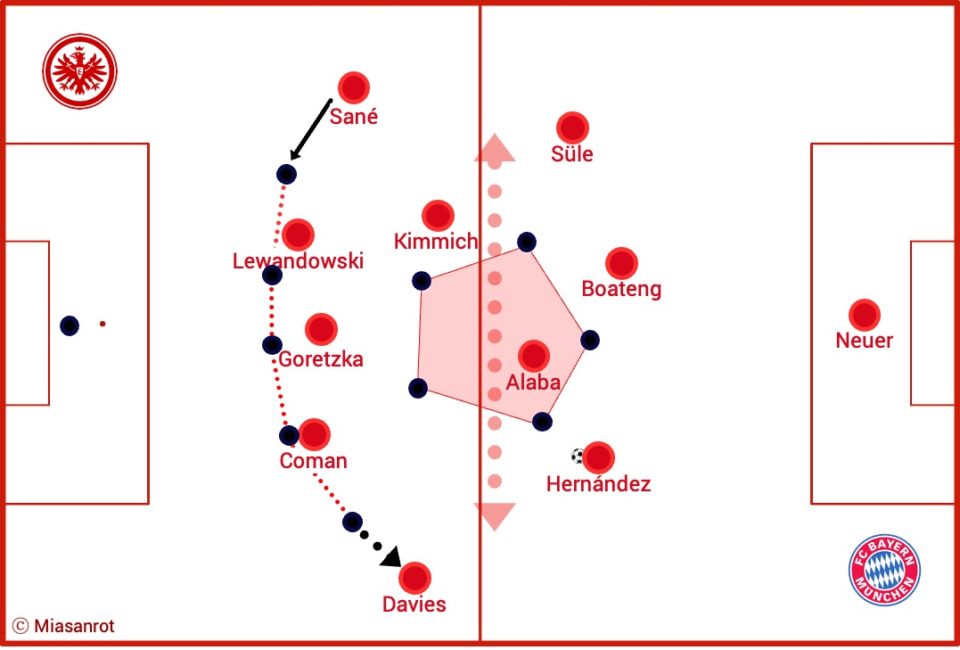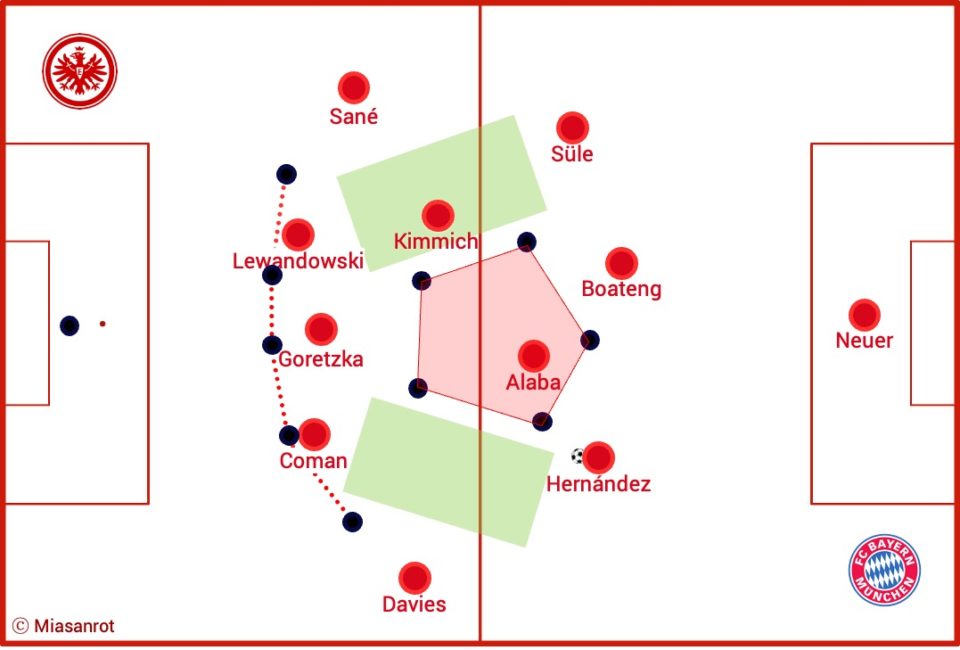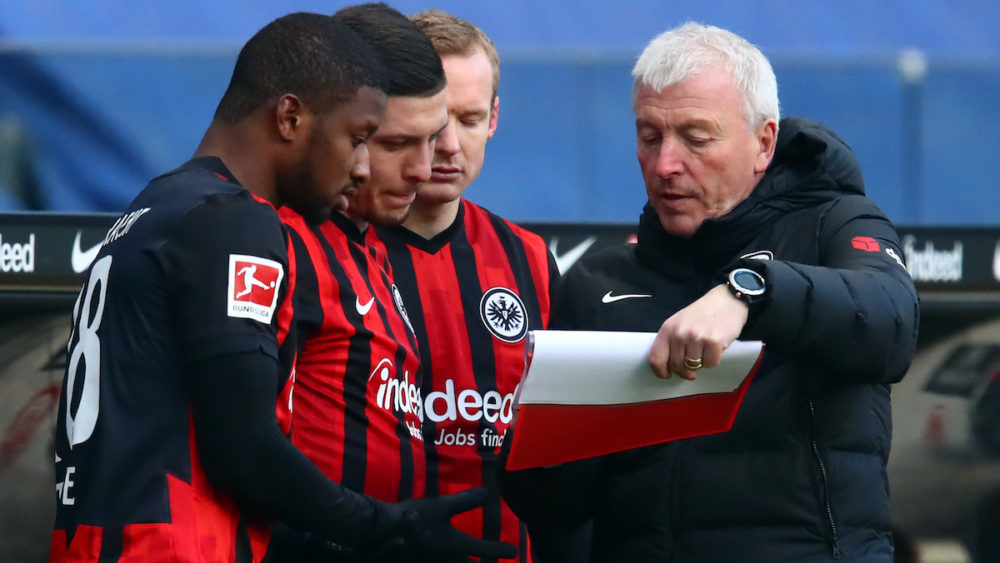Bundesliga MD 22 Preview: Frankfurt vs. Bayern
The draw with Bielefeld must have annoyed FC Bayern greatly. However, the result is not worth lamenting over for long. Coach Hansi Flick was forced to rotate the team more than usual due to the stresses of the journey to Qatar, and the differences in weather between Doha and Munich were stark.
Why the need for rotation especially can pose a serious challenge to a coach this season has repeatedly been a subject of intense discussion. The latest statements by Jürgen Klopp and Julian Nagelsmann on the subject underline this rather clearly. Both have pointed out, not for the first time, how difficult it is to integrate new players into the team this season. The reasons for this are complex.
Against this backdrop, as well as the uniquely packed calendar, the expectations of FC Bayern’s last summer signings should be adjusted accordingly. The language barrier, a lack of tactical training sessions, but above all the lack of opportunities for team-building exercises – all this weighs heavily.
We have signed a few players who simply don’t speak German, and for them the challenge of bedding in is even more difficult. They cannot get proper German lessons in a classroom, they do not have proper contact with their teammates outside the football pitch. […] You always see that newcomers, when it’s a very established team, have problems getting in, but this season it’s extreme.Julian Nagelsmann on the new arrivals for RB Leipzig
We then had three newcomers and they [have a] super hard time somehow bonding with the team.Jürgen Klopp on the new arrivals at Liverpool FC
Bayern are on their toes
With Injuries and COVID-19 cases piling up, there is now more playing time for those players who, for the aforementioned reasons, have not been able to properly settle in with the team. This no doubt has had an impact on the team’s performance.
Flick’s biggest concerns are in central midfield. Joshua Kimmich is the only fixture, while Thomas Müller and Leon Goretzka, two players who have been huge stabilizers of the team, are or were missing. Corentin Tolisso is a player who could have been expected to fill in for Goretzka passably well, because he has the skills and knows the team, the processes, and the coach longer than anyone else. Unfortunately, he, too, is now out for possibly the remainder of the season with a ruptured tendon.
Also unclear to many is why Marc Roca and Jamal Musiala have not been given more playing time so far. Julian Nagelsmann’s statement might help explain the mystery, at least in Roca’s case. The Spaniard still has to adjust to living in another country with a different culture, and it is obviously a big challenge for him to adapt to Bayern’s playing style. Especially in the game out of possession he lacks intensity, positional sense, movement patterns, and aggressiveness.
Musiala has a similar problem: He, too, lacks robustness and movement patterns in the game without the ball. For Flick, using these players poses a risk despite their potential in possession because his philosophy places a strong focus on (gegen-)pressing situations. As regards other alternatives, only David Alaba sticks out. The Austrian did not do a bad job in midfield recently, but sometimes lacks the feeling for the balance between attacking and defending. In addition, when he plays in midfield, the back four wants for leadership, as became evident in several situations against Bielefeld. Nevertheless, it is quite conceivable that he will continue to be deployed in midfield for the time being. At least Leon Goretzka seems to be an option again for the game at Frankfurt, although it is unclear how fit he already is having just come back from a COVID-19 illness.
Flick’s chess game
Besides the uncertainties in midfield, Bayern have worries at the back as well. Benjamin Pavard will be out for a while at right-back. The Frenchman, too, has been infected with the coronavirus, too. Bouna Sarr has not been able to adequately replace him thus far. His is probably the most obvious case of a lack of quality, but the same as with all the other new arrivals, it should not be forgotten that he, too, faces the same barriers to integration.
Nevertheless, Flick does not have much choice. He could move Niklas Süle to the right-back position, which worked very well against Leverkusen in December. With the return of Jérôme Boateng, a replacement for him in central defense would be available. However, it is unclear whether the 32-year-old has already recovered mentally from the tragic recent death of his former girlfriend. If Boateng cannot play, Flick will find himself in a tight spot. Lucas Hernández and David Alaba are the two remaining options – but the latter may be planned for midfield to counter the physically strong Frankfurt side.
It would also be possible for Flick to move Kimmich to right-back, but that would deprive his side of their key player in midfield, which would be a severe weakening. Whichever way Flick approaches the problem, everything is currently a compromise. It is like a game of chess where he has already been backed so far into a corner by his opponent that he has only previously few options left to prevent a checkmate.
Eintracht Frankfurt: What is the league’s most in-form team really capable of?
While Bayern are running on fumes, Eintracht Frankfurt could benefit from the critical shortage of personnel at the record champions, most of all because their strengths perfectly match Bayern’s weaknesses, which are exacerbated even further by the current situation. On the surface, Frankfurt have always been a team that seeks success through, out of possession, acting with great physicality, aggression, and a tireless work ethic, in order to hit their opponents in transition through their fast and technically adept players.
A closer look, however, reveals that there is a bit more to the Frankfurt success story. The fact that they have now been unbeaten in nine Bundesliga games (with eight wins) is not solely due to the fact that Bayer Leverkusen was the only top-class opponent during that run. It is because Frankfurt have used this phase to stabilise themselves and to make great strides in possession.
Stability following a change of formation
Adi Hütter’s team impresses with a lot of quick ball recoveries and an attack that knows how to use the available space on the break, but they are also able to control the space in the opponent’s half, especially against teams that are nominally equal or inferior. They know how to move the ball around and play it in behind to create goal scoring opportunities.
Frankfurt still benefit from the basics long established in the club’s philosophy but think much more offensively under Hütter than in recent years. With his 3-4-3, Hütter since November also seems to have found the ideal formation for his players and ideas at the moment.
Many teams in the Bundesliga have switched to this formation in recent weeks and months. Frankfurt, however, interprets it in a particularly efficient, flexible, and stable way. The keys to this lie in the compact center with three center-backs, two holding midfielders, and two number 10s, who out of possession help protect the center, as well as the wing-backs with a lot of operating space up and down the pitch. In phases of high pressing, they push forward, in deeper defensive phases they drop back to create a compact 5-2-3 or 5-4-1 formation.

Frankfurt’s axis
But in possession, too, Frankfurt benefit greatly from having many players in the center. Until a while ago, the big problem was that the Eagles were too dependent on their wingers – Filip Kostić in particular was often the single most important factor in how well Frankfurt would finish a game. To some extent, that is still the case. Kostić is probably the key player in Frankfurt’s attacking game. But Frankfurt has become more variable.
Through Martin Hinteregger, who pulls the strings at the back and, with his passing range, is able to beat the opposing press with one action, and their very industrious central midfield, Frankfurt are also able to create many attacks through the middle. A positive side effect: This gives Kostić even more space when the play is shifted to his side.
Behind the single center-forward, Hütter operates with two number 10s, who provide creative moments between the opponent’s lines. Daichi Kamada and Amin Younes usually form a duo that is difficult to stop. They draw opposing center-backs out of position, squeeze the opposition horizontally, and then use the resulting spaces on the wings and behind the defensive back line where one of the top strikers of the current season, André Silva, is lurking.
Three key factors for the outcome of the game
1. The battle for the centre
The previous observations suggest how Frankfurt are likely to stress Bayern. Even though they have been able to impress with a lot of space control in the opponent’s half in recent weeks, the game against Bayern will probably be more about fast forward play.
The challenge for Bayern will therefore be not to let them get the better of the crowded center. Playmaker Joshua Kimmich will need the support of his sidekick in midfield, but also that of the offensive players. Too often in recent weeks the team has been stretched too far between back and front. If Kimmich has to hold the ball for too long, it gives Frankfurt’s back five opportunities to pounce.
But if Bayern manage to keep Frankfurt busy in midfield, spaces could open up on the flanks. This could happen in transition, for example when Bayern win the ball and Kostić, who is usually very offensive-minded, leaves a lot of open space behind him. But it also applies to Bayern’s phases in possession, because, despite their wide back five, Frankfurt do not always manage to adequately defend the defensive outer lanes during quick lateral shifts. In addition, the block of five in the center is sometimes so narrow that free zones open up in the half-spaces, which Bayern can use when they move quickly.

2. Bayern’s horizontal compactness
Conversely, Bayern will also have to keep an eye on protecting their wings – even if Frankfurt build the attack through their creative center. One of the problems throughout the season has been Bayern’s lack of horizontal compactness. Sometimes they are too compact and thus give the opponents the opportunity to shift the play across, as a result of which the areas the full-backs have to cover become so vast that crosses can no longer be prevented effectively.
Frankfurt will want to exploit this weakness by repeatedly trying to isolate Kostić and put him in a good position for his dangerous crosses. At the same time, it is not just this one scheme that needs to be defended. If Bayern focus too much on defending Kostić, there could be spaces for the designated number 10s and Silva in attack, whose availability is still in question but should be expected. With Luka Jović, however, a strong replacement is waiting in the wings.
Bayern’s coordination problems with and without the ball could play into Frankfurt’s hands. With 43 goals, they are currently the strongest offensive team after Bayern.
3. Can Bayern stop Hinteregger?
In order to prevent phases in which the Bayern players only run behind, they need to command the spaces, especially in Frankfurt’s half, and deploy a dominant pressing in the middle and final thirds. An effective first and second pressing line are therefore crucial.
At the front, the “pressure on the ball” that is so often mentioned by Flick will be indispensable. Martin Hinteregger in particular should not be allowed too much time on the ball. His precise long strikes could make the back line of the league leaders look silly. Alongside Robert Lewandowski, the wingers and the number 10 are called upon to prevent Frankfurt from playing precise passes.
Hinteregger is a crucial element in just another high quality area of Frankfurt’s game as well: set pieces. Bayern have had a problem dealing with these not only since Bielefeld. Especially when it comes to corner kicks and free kicks from the middle of the park, they are too vulnerable.
Who will be better able to resist the pressure of the opponent?
All in all, the Bundesliga can look forward to a very lively attacking contest. Frankfurt at home will do everything they can to put Bayern under pressure. They will press high in some phases of the game. However, their main focus will be on taking the midfield around Kimmich out of the game. Because if Bayern do not seek to build the play composedly through their defensive midfield, Frankfurt will become a greater nuisance than the side from Munich would care for.
Eintracht are flexible enough to alternate between phases of deeper and higher defending and ask Bayern questions in different areas of the pitch. They currently have everything to be able to spring a surprise. Although the word “surprise” is almost the wrong choice here. Because, in fact, in their respective current conditions, the encounter will pitch two teams against one another who will meet on an equal footing. Frankfurt will not and must not hide, while Bayern will have to struggle to send a well-balanced eleven onto the pitch.
Bayern still need a win. If Leipzig get within three or two points at the weekend, the coming weeks could become uncomfortable. With the Champions League round of 16 clash at Lazio coming up, a noteworthy lead over their rivals in the table would definitely be reassuring. Therefore, the match could become an inflection point for the rest the season. A bad result would raise the pressure significantly over the coming weeks, while a win would provide some comforting breathing space. Whatever the outcome, it is not likely to be a walk in the park for either side.












[…] miasanrot.com| FC Bayern seemed to have regained some stability in at around the time of the Club World Cup, just in […] | Miasanrot.com | Read More […]